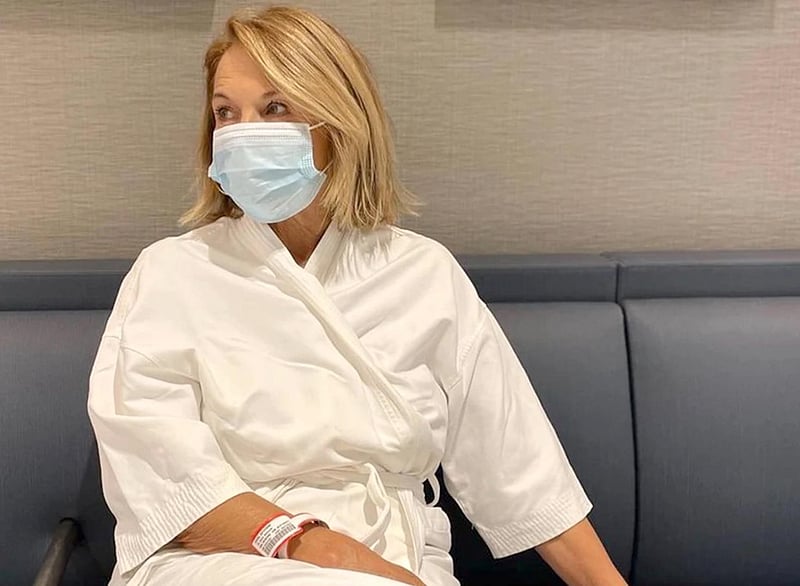Get Healthy!

- By Cara Murez HealthDay Reporter
- Posted September 28, 2022
Katie Couric Announces Breast Cancer Diagnosis
Former TV newswoman and TODAY show anchor Katie Couric has breast cancer.
Couric shared that information Wednesday on Instagram, while also releasing an essay about the experience on her media website.
"Every two minutes, a woman is diagnosed with breast cancer in the United States," Couric wrote on Instagram. "On June 21st, I became one of them."
Couric, 65, received her cancer diagnosis in June, had a lumpectomy on July 14 at NewYork-Presbyterian/Weill Cornell Medical Center and then began radiation treatments on Sept. 7, TODAY.com reported.
The anchor's name is often associated with cancer awareness because her first husband, Jay Monahan, died from colon cancer at 42, when their children were young. Couric has long been a spokeswoman for getting colonoscopies to catch cancer early.
Couric wrote about sharing her cancer news with her daughters, Ellie, now 31, and Carrie, 26.
"Finally, four days after I was diagnosed, I FaceTimed each of them," she wrote. "I tried to be as reassuring as Dr. Newman. Their faces froze in disbelief. Then shock. Then they began to cry. 'Don't worry,' I told Carrie then Ellie, 'I'm going to be fine,' trying to convince myself as well as them."
"They'd already lost one parent. The idea of losing another was unfathomable," she wrote.
Her own experience in learning about the diagnosis was also one of distress and "suspended animation."
"I felt sick and the room started to spin," Couric wrote. "I was in the middle of an open office, so I walked to a corner and spoke quietly, my mouth unable to keep up with the questions swirling in my head."
Although Couric's family has no history of breast cancer, the family has endured many cancer diagnoses and deaths. In addition to Monahan, Couric's sister died at age 54 from pancreatic cancer. Her mother-in-law died from ovarian cancer. Her parents also have a cancer history.
"My mood quickly shifted from disbelief to resignation," she wrote. "Given my family's history of cancer, why would I be spared? My reaction went from 'Why me?' to 'Why not me?'"
About 85% of the 264,000 U.S. women who are diagnosed with breast cancer each year do not have a family history of the disease.
Couric urged women to get their regular exams.
"Please get your annual mammogram," she wrote. "I was six months late this time. I shudder to think what might have happened if I had put it off longer. But just as importantly, please find out if you need additional screening."
One oncologist echoed Couric's plea that every American follow cancer screening guidelines.
"It is crucial to identify early signs of breast cancer. Self-examinations, clinical breast examinations, and screening mammograms are essential to ensure that proper care is provided to detect breast cancer early and before breast cancer advances," said Dr. Penny Anderson. She's chief of the division of breast and gynecologic radiation oncology at Fox Chase Cancer Center in Philadelphia.
"Symptoms of breast cancer can include palpable lumps, puckering or dimpling or discoloration of the skin, changes in the breast size or shape, or nipple inversion/discharge," Anderson explained.
According to Anderson, breast cancer patients now have good treatment options.
"Breast cancer, especially when detected in early stages, is curable," she said. "Treatment options include breast conserving surgery (lumpectomy), and evaluation of the lymph nodes, followed by radiation treatments to the breast region."
Couric wrote, "As we approach #BreastCancerAwarenessMonth, I wanted to share my personal story with you all and encourage you to get screened and understand that you may fall into a category of women who needs more than a mammogram."
She said she will not need chemotherapy because the risk of her cancer returning is low.
"I was warned that I may be fatigued and my skin may turn a little pink," Couric wrote about radiation. "Yesterday was my final round. My left breast does look like I've been sunbathing topless, but other than that, I've felt fine."
More information
The U.S. Centers for Disease Control and Prevention has more on breast cancer.
SOURCES: TODAY.com; Penny R. Anderson, MD, chief, division of breast and gynecologic radiation oncology, Fox Chase Cancer Center, Philadelphia






